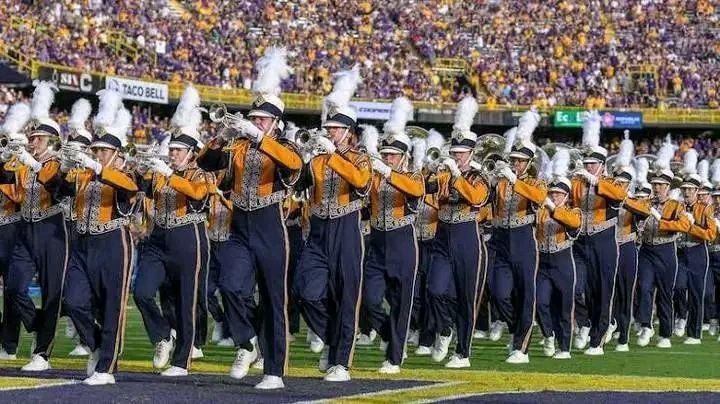May 11, 2025 – Baton Rouge, Louisiana — In a moment that will be etched into the annals of collegiate history, the Louisiana State University (LSU) Tigers Marching Band has received a groundbreaking international honor. Earlier today, ESPN announced that the Golden Band from Tigerland emerged victorious in a fiercely competitive global showcase of musical ensembles, outperforming some of the finest marching bands from Europe, Asia, and Latin America. The announcement, which sent waves of excitement through LSU’s campus and its passionate fanbase, came after an exhaustive evaluation process that combined technical expertise, audience reception data, and artistic originality.
A New Global Standard
This wasn’t just any recognition. The accolade was the result of a months-long, highly detailed international evaluation that measured performance on a scale previously unseen in marching band competitions. According to ESPN’s statement, the process involved four primary pillars: expert panel judging, audience impact metrics, technical precision scores, and creativity benchmarks. Each ensemble was analyzed under the scrutiny of music theorists, choreographers, sound engineers, and cultural historians from around the globe.
Despite the depth of talent from the participating nations, the LSU Tigers emerged as the definitive leader. Their combination of razor-sharp precision, bold showmanship, and unmistakable Southern flair created a magnetic force that captivated both the audience and expert judges.
The Heart of the Tiger: Tradition and Innovation
What set LSU apart? For starters, the Golden Band from Tigerland has long been recognized as one of the premier collegiate marching bands in the United States. Known for their electrifying performances at LSU football games, their signature pregame salute, and a repertoire that seamlessly merges classical composition with contemporary rhythm, the Tigers have always stood tall among their peers.
However, this international accolade brings their excellence to a new dimension.
“LSU’s performance was nothing short of spectacular,” said Mariko Hoshino, a Japanese conductor and one of the lead judges on ESPN’s international panel. “Their sound was full-bodied and disciplined, yet it breathed with creativity. The way they brought storytelling into their formations and musical phrasing was groundbreaking.”
Their acclaimed halftime performance that clinched the honor featured a thrilling medley of American jazz, Creole brass, and cinematic scores, with seamless transitions and precise drill formations that evoked imagery of Louisiana’s vibrant culture and LSU’s proud legacy. The spectacle didn’t just entertain—it transported.
Global Competition, Local Pride
The LSU Tigers weren’t alone in their pursuit of excellence. The competition included some of the finest ensembles from across the world, including the Vienna State Music Corps (Austria), the Blue Phoenix Ensemble (Japan), Brazil’s Escola de Ritmo Nacional, and the South Korean Sori Marchers. Each brought a unique blend of cultural tradition and musical prowess.
And yet, LSU’s program found the perfect intersection of tradition and reinvention. “We weren’t just showcasing what we could do musically,” said Dr. Kelvin Jenkins, LSU’s band director. “We wanted to tell a story that only the LSU Tigers could tell—a story of resilience, heritage, and unrelenting spirit.”
Metrics Behind the Magic
The evaluation wasn’t limited to the subjective eye or ear. ESPN implemented a comprehensive system of data analytics to assess audience impact. Using real-time crowd responses, social media engagement, and digital viewership trends, the LSU Tigers outpaced their competitors with a 35% higher engagement rate and a 92% approval rating among online voters.
From a technical standpoint, LSU achieved the highest aggregate score in rhythmic timing, tonal balance, and formation precision. Their use of complex crossfield exchanges and dynamic shifts in volume and tempo left even veteran judges in awe.
A Win for LSU—and America
This triumph resonates beyond the confines of LSU’s campus. In a time when international cultural exchange is more vital than ever, the Golden Band from Tigerland’s victory represents a celebration of American musical innovation and diversity. It demonstrates that collegiate performance arts can not only match but redefine global standards.
LSU President William F. Tate IV expressed his pride during a press conference: “This achievement speaks volumes about the talent, discipline, and creativity that defines our students and faculty. The LSU Tigers have become ambassadors not just of Louisiana, but of American artistic excellence.”
Looking Ahead
With global acclaim now added to their resume, the LSU Tigers are already being invited to perform in international festivals and events. There are reports of interest from organizers of the Tokyo Symphony Festival, the Berlin Sound Parade, and even an invitation to headline the opening ceremony of the 2026 FIFA World Cup in North America.
Despite the new attention, the LSU band remains grounded. “This recognition is wonderful, but we’ll be back on the field this fall doing what we love most—firing up the crowd at Tiger Stadium,” said Drum Major Mia Rodriguez. “Nothing beats the roar of Death Valley on a Saturday night.”
Conclusion
The announcement from ESPN marks more than just a win for the LSU Tigers Marching Band—it marks a transformation in how collegiate musical performance is viewed on the world stage. Through a fusion of heritage, discipline, and boundless creativity, the Golden Band from Tigerland didn’t just compete; they conquered.
As the reverberations of this triumph continue to echo globally, one thing is clear: the LSU Tigers have marched not just into victory, but into history

